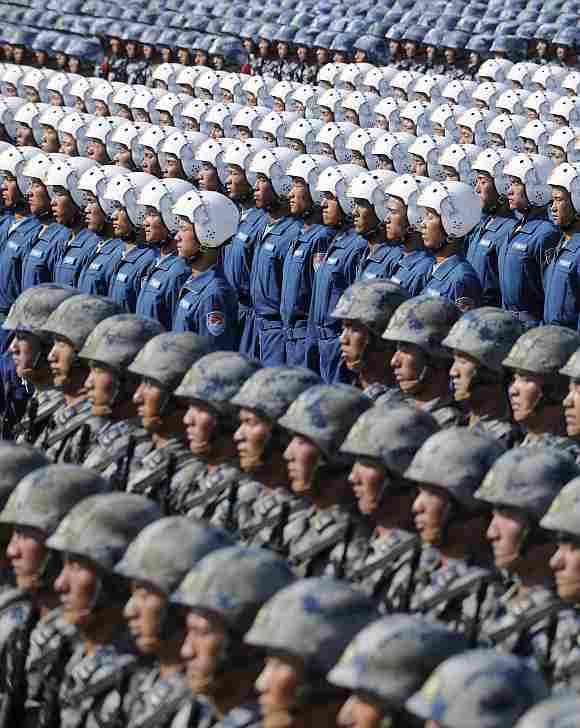 In the case of India, there are no specific references in China’s white paper. However, there are several takeaways for India, says Srikanth Kondapalli.
In the case of India, there are no specific references in China’s white paper. However, there are several takeaways for India, says Srikanth Kondapalli.
China released its 9th White Paper on defence issues recently. These have been issued in alternate years since 1998, although it had called the latest paper as the first such paper on ‘China’s military strategy’.
Many of the paper’s positions are well known and sometimes have been repeated from the previous papers. However, one major direction of the paper signifies that China is contesting the United States global and regional dominance by openly advocating ‘protection of its interests abroad’ -- a phrase frequently seen in US documents.
Firstly, as the major beneficiary of globalisation process by which today China had become the 2nd largest economy in the world and largest trading partner for 128 countries, it realises that it is invariably tied to the global economy. Yet, in the light of the United States’ global dominance, China’s challenge is to create a niche for itself, without at the same time becoming a target of the US bipolar ire that cost the Soviet Union dearly. The white paper made it clear on this issue thus: “International competition for the redistribution of power, rights and interests is tending to intensify”.
China’s recent initiatives on the Silk Road and Asian Infrastructure Investment Bank and others make it clear that today the country is knocking at the gates of international levers of power. This is a signal that the current leadership in China is moving away from Deng Xiaoping’s dictum of “taoguang yanghui” [keeping a low profile] to exhibiting capabilities. China realizes it is facing “increasing external impediments and challenges” and yet it wants to expand its global and regional imprint.
At times, China also had revised its fear of domestic democratisation issues by accusing others of ‘instigating a colour revolution’ -- referring to the phenomenon in Kyrgyzstan, Ukraine and Myanmar in the 1990s.
More critical are the targets outlined for the armed forces of the country. This is a clear indication where the armed forces of China are tasked to play a crucial role in projecting power. With an estimated official defence allocations of over $142 billion (but could be more than double these figures), China is clearly nudging its armed forces to play bigger role.
The white paper is unequivocal on this count. It orders “the armed forces will …effectively secure China's overseas interests.” The armed forces will “safeguard China's security and interests in new domains” and “maintain regional and world peace”.
With more than half of the economy of China now dependent on exports and imports mainly coming from the seas, the naval forces are now ordered to “protect the security of strategic sea lines of communication and overseas interests”. As a power projection force --as the previous 2012 white paper acknowledged -- the naval forces are now singled out for strategic and global missions with increased outlays.
Not only will the country’s navy operate expeditionary forces henceforth but also contribute to the maritime might of the country. China’s two ocean strategy -- in the Pacific and the Indian Oceans -- forward bases in the South China Sea, Arabian Sea and in the Gulf of Aden will provide the navy with power projection in addition to the hardware it is acquiring recently.
Another major thrust of China is in the cyber and space domains -- clearly an issue that has raised concerns in the world today. While the air force of the country will restructure to include space missions the country is making efforts to “secure its space assets”. China is also all set to establish cyber forces.
In the case of India, there are no specific references in this white paper. However, there are several takeaways for India. Both land territorial and oceanic security issues were raised in the white paper. India and Bhutan are the only two land neighbours with which China had not resolved its territorial dispute, despite over three decades of talks. Referring to the periodic transgressions on the borders and the ensuing security issues, despite the recent arrangements on confidence building measures, the white paper cautions China’s military that “Certain disputes over land territory are still smouldering.”
Here the white paper’s injunctions to the country’s army to conduct swift pan-theatre mobilisation of troops suggests that China had not given up the option of using force in one way or the other to resolve its territorial disputes.
After 19 naval contingents sent to the Gulf of Aden since 2008, and the successful evacuation of Chinese nationals from war-torn Egypt, Libya, Syria and Yemen recently, China today feels confident in “open seas protection” in the Indian Ocean region as well. While China still lacks tactical air support and assured logistics supplies in sustaining naval operations in the region, the country had major strides in exploring bases abroad such as plans for Gwadar and Hambantota and planning to build four more aircraft carriers. India then needs to watch these twin developments on the borders as well as in the oceanic domain.
More uncertainty is to prevail in the nuclear domain. While India has now been engaged in low-key level discussions on this issue with Beijing, China through this white paper suggests that it is going to enhance its nuclear deterrence capabilities.
India also needs to learn from the higher command-led reorganisation process being undertaken in China, specifically demobilisation of support troops, modularisation and jointness between armed services. For, while China demobilised its troops ten times so far and reduced infantry and support troops so as to make the forces lean and mean, India never attempted such efforts.
Srikanth Kondapalli is professor in Chinese Studies at Jawaharlal Nehru University, New Delhi.









